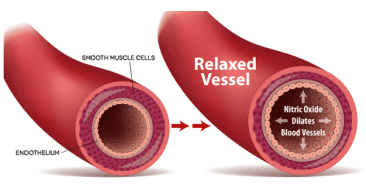Fibromyalgia Introduction, Type 3: Nitric Oxide Dysregulation Series by Lotus Spring Acupuncture & Wellness Inc.
Think of a traffic jam. In some areas you have too many cars; in other areas, there aren’t enough. Now replace the cars with a gas that can either help restore homeostasis to the body or cause nerves to disintegrate and you begin to understand the importance of them being distributed safely. This tends to manifest in ways based on the fight or flight mechanism.
With fibromyalgia type three: Nitric Oxide Dysregulation, you either experience pain in the shoulders, which is the flight response. Where are you aren’t allowed to punch or claw, which is your natural response; so as it’s built up and not used, it creates long-term tension that builds in the shoulders. The other experience that you could be having is a pain in the lower back, which is the flight response. Energy surges to the legs, but you have nowhere to run. The tension builds in the lower back.
With increased oxidation, the liver loses efficiency in cannibalizing cortisol, so these stress hormones will build up in the body through the bloodstream causing a repeat of Traumatic feelings. Initially, they have trouble getting to sleep, but as the oxidative damage begins to destroy the liver, kidneys, and nervous system, they will begin waking up one to 3 o’clock in the morning.
An increase in vivid dreams and in severe cases, nightmares may take effect. To release some of the build-up nitric oxides, the body will tend to cause people to site in order to self-regulate. With high stress and do you regulate nitric oxide, the body suffers nerve pain. It’s common to feel pain behind the eyes from a combination of intraocular pressure and oxidative disintegration of the optic nerve. This type of fibromyalgia is associated with dysregulation of melatonin. Melatonin has direct actions on pain signaling.

In order to treat this, Nitric Oxide Dysregulation, we need to reduce stress and improve sleep through reduced nitric oxide, sighing, and work to move the tension out of the body. It is also important to address long-term liver damage. We use herbs to regulate the nitric oxide, to reduce stress, regulate melatonin, and improve your sleep. We also address liver cirrhosis and regulate got inflammation to reduce irritable bowel disorder.
These interventions have been shown to have a regulatory effect on hormones. Some of the key signs and symptoms, from fibromyalgia type three: Nitric Oxide Dysregulation, that you may be experiencing can include; pain which is improved by moving, often associated with an irritable bowel disorder, pain which is worse than with sitting and with stress and poor sleep, most common causes of fibromyalgia, and accompanied with sleep deprivation and insomnia.
Our acupuncturist Dan Clark has done wonders to be able to improve the health and wellness of many people who have fibromyalgia, especially type 3: Nitric Oxide Dysregulation. His goal is to increase the quality of life in all his patients. If you are you know someone who needs help increasing their abilities through these methods, please don’t hesitate to refer them to our acupuncture and Chinese medicine treatments. Dan Clark has patients come from several outside states, just to see and experience and have the results that they want. Dan is welcoming and always looking to help more people.
In order to treat fibromyalgia type 3: Nitric Oxide Dysregulation, we need to reduce stress and improve sleep through reduced nitric oxide & move the tension out of the body.
For more information on how you or a loved one can set up a scheduled appointment please visit our website at lotusspringacupuncture.com or email us at schedule@lotusspringacupuncture.com and let us know how we can help. Make sure to also watch out for our next part of the fibromyalgia journey, and how we can help you find more resources and information on your chronic illness.
The Eight causes of Fibromyalgia: http://lotusspringacupuncture.com/eight-causes-of-fibromyalgia/
Check us out on Medium and Linkedin

If you’re looking to receive effective treatment for ANY health condition, we recommend you start looking for a TCM practitioner in your area. If you’re within the state of Utah, don’t hesitate to reach out to Lotus Spring Acupuncture & Wellness to receive the best holistic healthcare and acupuncture treatments.
Dan Clark has years of highly specialized training and experience in the field of acupuncture in Utah. With being in business for over 18+ years, we’re the ones who can give you personalized treatment to help you attain your personal health goals.
